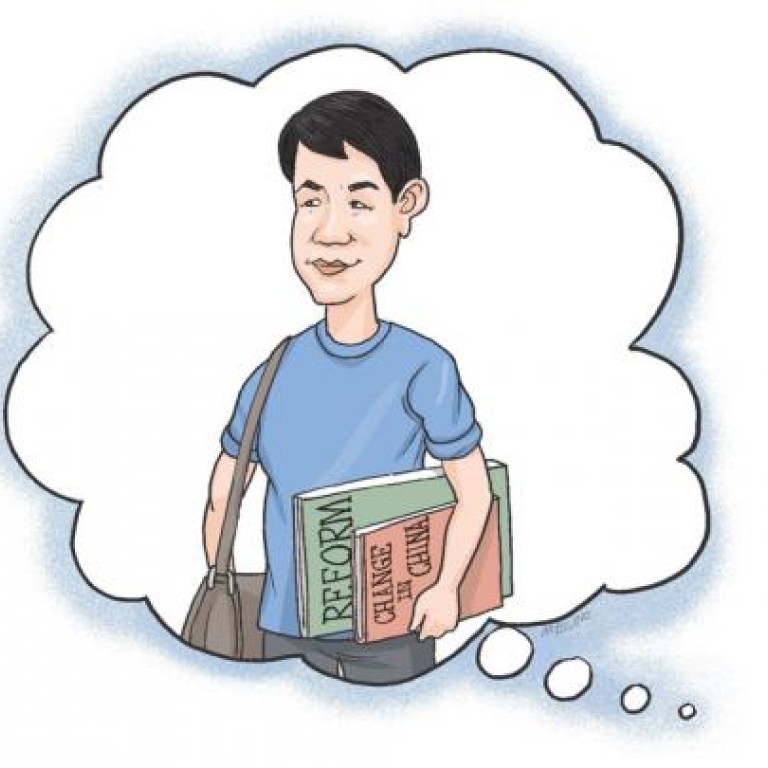
Don't pin reform hopes on Chinese leaders' youthful idealism
Chang Ping says people who want a democratic China must not read too much into the youthful idealism of their authoritarian leaders, lest such false hopes make them lose their will to fight
A article last week on China's incoming premier quoted one of his contemporaries as saying: "Like all of us back then, Li Keqiang was idealistic, open-minded, incisive and eager to see China change." The speaker was Wang Juntao, a pro- democracy activist once jailed by the government for his role in the Tiananmen protests, and who now lives in exile.
The article, titled "Reformist hopes for China's new No 2", described Li's years as an undergraduate at Peking University. "Mr Li arrived there in 1978 with a thirst for Western ideas and a curiosity about individual rights, market economics and democracy," it said. Wang, who also attended Peking University at that time, was a classmate and friend.
No one, it seems, can forget the four years Li spent at the university, and how they might have shaped him, even though he failed to achieve anything memorable in his previous posts during 30 years in politics. Nor can anyone point to signs of liberal thinking. Perhaps he's waiting for the right moment, some say. "We all have a hope that he hasn't abandoned the beliefs of his youth," Chen Ziming, a political commentator who also served time in jail for the 1989 protests, told the newspaper. "Perhaps we were hoping for too much."
But Wang was not ready to give up. "He may be a bit naive, but I think he's sincerely honest," he told the paper.
Since Li came to prominence, Wang has given many interviews in which he spoke of his hopes for his school-day friend. This brings to mind Wan Runnan, another June 4 activist in exile. Wan, who is from an older generation, was a classmate of Hu Jintao at Tsinghua University, and they both served in student organisations. When Hu was first named chairman of the Communist Party, Wan wrote a heartfelt essay, titled "My Senior, Hu Jintao", describing the young Hu as "humble, even-tempered and friendly". Wan praised his friend for his "meticulous thinking" and "gentle and elegant manners", for being "considerate", "someone that makes you feel comfortable". This portrayal contrasted sharply with the public image of Hu - a rigid, stubborn and hard man who would trample on the rights of others to win power.
Now it's Xi Jinping's turn. There are many accounts of the hardship the young Xi went through, the friendships he struck up with villagers when he was "sent down" to the countryside during the Cultural Revolution, and his political awakening in the heady days of the 1980s when China was beginning to open up. These stories make people believe he would surely lead China to a more democratic future; with his kind of background, why wouldn't he push for political reform?
In 10 years, a generation moulded by the events of June 4 will take over as leaders. I can imagine that, if China's political situation were to remain unchanged, at least some of those coming into power would have had something to do with the Tiananmen movement, perhaps even taken part in the protests. They, too, believed in ideals, and perhaps were even prepared to die for them. I once strongly believed that our future was shaped by the ideas of our youth. I don't any more.
How can four years of liberal university education possibly outweigh 34 years of training in a communist regime? The leaders who survived the elimination rounds in their rise through the ranks are all seasoned Communist fighters. They would have made their peace with both China's authoritarian political system and the June 4 crackdown. Don't imagine they suffer any kind of a psychological burden.
Besides, when it came to youthful idealism, the extent of sacrifice one was prepared to make for those ideals and the influence by Western democratic thinking, who could compare with Mao Zedong and his cohort of leaders? Their youthful idealism did not stop them turning China into a modern autocracy. We have no reason to continue putting our trust in idealistic youth.
And let's not forget it was idealism that gave some people in power the pretext for murder. So, people were starved to death during the Great Leap Forward because China needed to build itself up; "counter-revolutionaries" were beaten to death for the sake of the Cultural Revolution; the June 4 activists were mowed down to safeguard the country's development; and protesters today are violently suppressed to maintain social harmony.
No doubt friendships made in youth should be cherished, and stories about political leaders' formative years can help us understand them better. But they also raise false hopes for a more democratic China. Whatever their intent, those people who champion hope in the youthful ideals of our leaders feed a fantasy that will sap our determination to push for change. This will be tragic, because only through resistance can these ideals be achieved.
